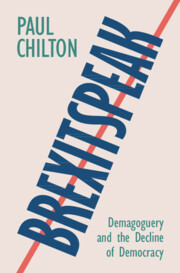Book contents
- Brexitspeak
- Brexitspeak
- Copyright page
- Dedication
- Contents
- Figures
- Acknowledgements
- Introduction: Populists, Demagogues, Language
- 1 Identity
- 2 We
- 3 The People
- 4 The British People
- 5 Fear of Foreigners
- 6 Fear of Foreigners Mobilised
- 7 How Demagogues Do It
- Conclusion: Brexitspeak, Demagoguery, Decline of Democracy
- Book part
- References
- Index
3 - The People
Published online by Cambridge University Press: 22 November 2024
- Brexitspeak
- Brexitspeak
- Copyright page
- Dedication
- Contents
- Figures
- Acknowledgements
- Introduction: Populists, Demagogues, Language
- 1 Identity
- 2 We
- 3 The People
- 4 The British People
- 5 Fear of Foreigners
- 6 Fear of Foreigners Mobilised
- 7 How Demagogues Do It
- Conclusion: Brexitspeak, Demagoguery, Decline of Democracy
- Book part
- References
- Index
Summary
Farage also used ‘we’ to show that he identified with ‘the people’. The ideas underlying this phrase need to be understood in their historical context, since they vary depending on particular national histories, but all share a common ancestor in ancient Greek and Roman thinkers. British democracy needs to be traced back to British thinkers such as Buchanan, Hobbes and the philosophers of the Enlightenment. This is relevant because the historical discourse surrounding the phrase ‘the people’ was central to the development of democracy, and is continuous with today’s challenges to it. The various notions of ‘the people’ were connected with the ‘sovereignty of the people’ and the ‘sovereignty of parliament’, the latter being expressly challenged by populist parties like UKIP, in favour of direct democracy, and the same trend was evident in the post-referendum governments. The expression ‘the common people’ played an important role in British political discourse. Its early meaning changed radically until it was replaced by ‘ordinary people’, which in the Brexiter demagoguery was equated with ‘the people’, in opposition to ‘the elite’.
Information
- Type
- Chapter
- Information
- BrexitspeakDemagoguery and the Decline of Democracy, pp. 61 - 84Publisher: Cambridge University PressPrint publication year: 2024
